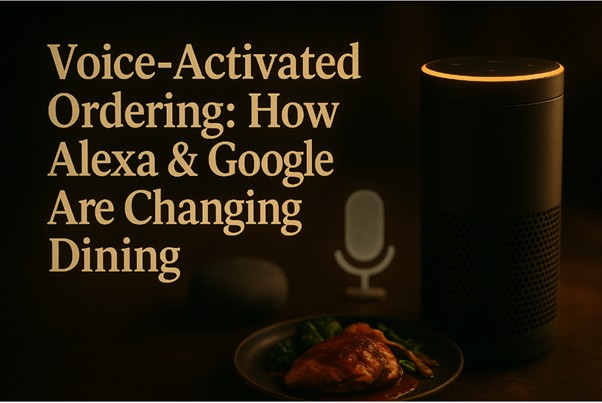
Voice-Activated Ordering: How Alexa & Google Are Changing Dining
In an increasingly digital and convenience-oriented world, restaurants continue to explore groundbreaking technologies to enhance customer experience and streamline operations. Among the latest trends reshaping the restaurant industry in 2025 is using voice-activated ordering through intelligent assistants, such as Alexa and Google Assistant. According to renowned culinary expert Chef Shajahan M. Abdul, founder of Restro Consultants Pvt. Ltd. (RCPL), voice-enabled technology is quickly transforming the way customers interact with restaurants, reshaping not just ordering but the entire dining experience.
Why Voice-Activated Ordering Matters
Today’s customers crave convenience and speed. Although efficient, typing orders through mobile apps or websites can still seem tedious, especially during busy hours. Voice ordering and leveraging smart home devices such as Alexa or Google Assistant provide unprecedented ease. Patrons can say, “Alexa, order dinner from my favourite restaurant,” and their request is processed seamlessly. As Chef Abdul highlights, “Integrating voice technology creates frictionless ordering experiences, enhancing customer satisfaction significantly.”
According to restaurant consultants at RCPL, voice ordering increases order accuracy, reduces staff workload, and enhances operational efficiency. When correctly integrated, it also offers immense marketing potential, creating new avenues for customer engagement.
How Voice Ordering Works in Restaurants
Voice ordering integrates restaurants’ ordering systems directly with Amazon Alexa and Google Assistant platforms. Customers who own voice assistants at home or smartphones equipped with these technologies can effortlessly place orders by verbally interacting with these devices.
Chef Shajahan M Abdul explained that voice technology also leverages artificial intelligence (AI) to understand customer preferences and ordering patterns. Over time, these systems learn individual customer habits, offering personalised recommendations, remembering favourites, and significantly enhancing customer loyalty.
Benefits of Voice-Activated
Ordering
1. Enhanced Customer
Convenience
Convenience is the primary
advantage of voice-activated ordering. Customers appreciate hands-free
interaction, which significantly simplifies the ordering process. According to
restaurant consultants at RCPL, restaurants that offer a voice-ordered
experience increase customer satisfaction and repeat business.
2. Reduced Errors and Improved
Order Accuracy
Traditional ordering methods,
such as phone calls or manual entry, often result in errors. Voice-activated
ordering, supported by AI-driven technologies, significantly reduces errors by
eliminating the misunderstandings common in traditional methods. Chef Abdul emphasises,
“Fewer errors mean fewer complaints, higher customer satisfaction, and lower
costs associated with order corrections.”
3. Increased Efficiency and
Cost Savings
With automation handling a
significant portion of order processing, restaurant staff can concentrate on
preparing and delivering quality food and service. As Chef Shajahan M. Abdul
consistently advises his clients at Restro Consultants Pvt. Ltd. (RCPL),
embracing automation increases efficiency and directly impacts profitability.
4. Personalisation and Enhanced
Customer Experience
Voice-enabled systems
intelligently track previous orders and preferences, providing personalised
suggestions. Restaurant consultants at RCPL emphasise that personalised
recommendations lead to higher customer engagement, resulting in increased
revenue and customer loyalty.
Challenges and Solutions
While voice ordering offers
substantial benefits, there are inherent challenges that restaurants must
address.
Integration Complexity
Integrating voice ordering into
existing restaurant systems can be complex and require technical expertise.
Restaurant consultants recommend partnering with experienced technology
providers or expert consultancy firms, such as Restro Consultants Pvt Ltd
(RCPL), to ensure a smooth integration. Chef Abdul stresses, “Proper planning
and professional support significantly simplify adoption, ensuring seamless
operations.”
Privacy and Data Security
Concerns
Voice ordering platforms
collect customer data, raising privacy concerns. Restaurants must clearly and
transparently communicate their data usage policies to customers, prioritising
robust cybersecurity measures. As Chef Shajahan M Abdul emphasised, maintaining
trust through secure data-handling practices is essential in preserving
customer loyalty and brand reputation.
Customer Adoption and Learning
Curve
Not all customers are
immediately comfortable adopting new technologies. Chef Abdul suggests offering
clear communication, incentives, or tutorials to familiarise customers with the
benefits of voice ordering, thereby accelerating acceptance and increasing
usage rates.
Real-World Impact and Case
Examples
Leading restaurants globally
are already integrating voice ordering into their services. Early adopters
report significant improvements in customer engagement and efficiency. Restro
Consultants Pvt Ltd (RCPL) has guided several restaurants through successful
implementations, witnessing firsthand how voice technology can enhance
operational excellence and customer satisfaction.
Chef Shajahan M Abdul shares,
“Restaurants using voice ordering report improved customer retention and
notable revenue increases, confirming the substantial potential of voice
technology in the hospitality sector.”
The Future of Voice-Activated
Ordering
Voice ordering is set to become
even more advanced. Industry experts predict greater integration with smart
devices, including in-car systems and wearable technology, enabling customers
to order effortlessly from anywhere. Restaurant consultants predict that voice
ordering will become a standard feature rather than an optional one within the
next few years.
Recommendations for Restaurants
To stay competitive,
restaurants must proactively embrace voice ordering. Chef Abdul recommends the
following steps for seamless adoption:
Final Thoughts from Chef
Shajahan M Abdul
In conclusion, voice-activated
ordering, driven by Alexa and Google Assistant, represents a significant
advancement in restaurant technology. Its seamless integration into customers’
daily lives ensures continued growth in its popularity and usage. Adopting
voice technology early is crucial for restaurants seeking to stay ahead in an
increasingly competitive landscape.
As Chef Shajahan M Abdul wisely
states, “Innovation isn’t optional in the restaurant industry—it’s essential.
Voice-activated ordering is more than a trend; it’s the future of how
restaurants engage customers.”
By leveraging expertise from
trusted partners like Restro Consultants Pvt Ltd (RCPL), restaurants can
confidently embrace this exciting technology, significantly enhancing the
dining experience and ensuring lasting success in the digital age.
Chef Abdul © Copyright 2024. All rights reserved.